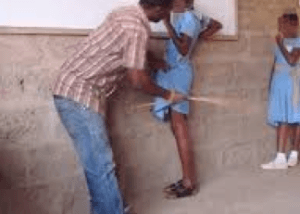Corporal punishment still widely used in Ghana
 Mr Sylvester Kyei-Gyamfi, the Head of Research at the Department of Children, has criticised the wide use of corporal punishment as a disciplinary measure in schools and homes in Ghana.
Mr Sylvester Kyei-Gyamfi, the Head of Research at the Department of Children, has criticised the wide use of corporal punishment as a disciplinary measure in schools and homes in Ghana.
He said the practice, with the prime motive to inflict pain, was wrong and inhumane.
Mr Kyei-Gyamfi was speaking at a workshop on the; “Dissemination of the Child Family Welfare Policy and Associated Documents” in Ho.
He said caning only hardened children and despite directives that only head-teachers used the cane following a strict protocol, class teachers and even school aides continued to wield and use the cane.
Mr Kyei-Gyamfi expressed worry about the practice among some members of the public to hypocritically suppress cases of sexual abuse of children.
He said the process of upgrading child welfare policies would culminate in Ghana having germane child protection laws in consonance with world trends.
Mr Israel Akrobortu, the Volta Regional Director of the Department of Children, said the Mapping and Analysis study and the Child Protection Baseline Research, revealed “a disconnect between legal provisions in place and community approaches to dealing with child and family welfare issues.”
Generally, “child maltreatment is assuming worrying heights,” he said, and that the policy would cover child and family issues as well as justice for children.
Mr Akrobortu called for co-ordination and collaboration among stakeholders to ensure the policy moved on to the implementation stage.
Ms Veronica Avati, the Child Protection Specialist of UNICEF, funding the programme, said: “UNICEF’s conviction is that the policy is developed through wide consultations to encompass the values and aspirations, ideals and principles of the Ghanaian people so it is a policy that is fit for Ghana.”
She said the new Child and Family Welfare Policy placed ‘working with families’ at the heart of a range of measures to safeguard children.
Ms Avati said: “This new approach honours both the child as an active agent in society with rights of his or her own, as well as Ghana’s strong cultural heritage of providing a safety net to vulnerable children through family and com
Source: GNA
